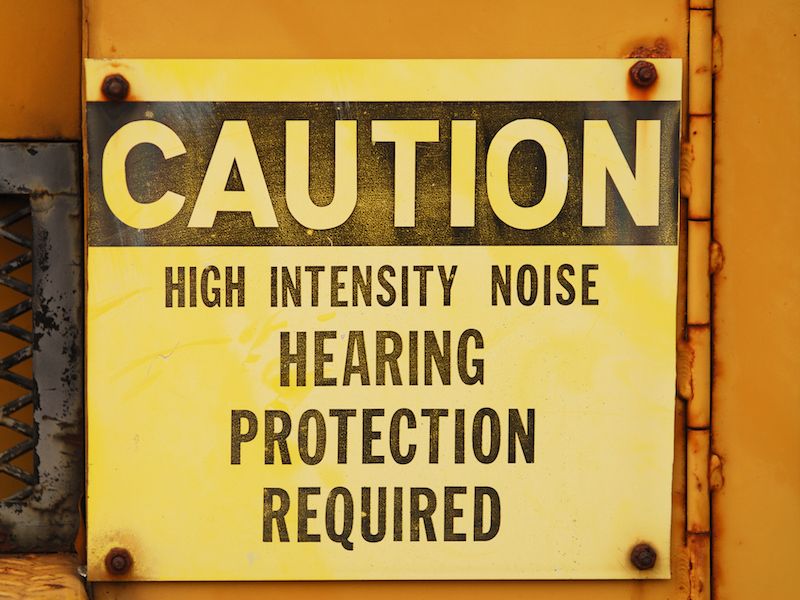
It’s one thing to know that you need to protect your ears. Knowing when to safeguard your ears is another matter. It’s more challenging than, let’s say, knowing when you need sunblock. (Is it sunny and will you be outdoors? Then you need sunblock.) It’s not even as simple as recognizing when to wear eye protection (Working with dangerous chemicals? Doing some building? You need eye protection).
When dealing with when to wear hearing protection, there seems to be a huge grey area which can be dangerous. Unless we have specific knowledge that some place or activity is hazardous we tend to take the easy road which is to avoid the issue entirely.
Evaluating The Risks
In general, we’re not very good at assessing risk, especially when it comes to something as intangible as lasting hearing problems or hearing loss. To demonstrate the situation, check out some examples:
- A very loud rock concert is attended by person A. 3 hours is around the length of the concert.
- Person B owns a landscaping business. After mowing lawns all day, she goes home and quietly reads a book.
- Person C works in an office.
You might presume that person A (let’s call her Ann, to be a little less formal) might be in more hearing danger. For most of the next day, her ears will still be ringing from the loud concert. It seems rational to presume that Ann’s activity was quite hazardous.
Person B (let’s just call her Betty), on the other hand, is subjected to less noise. There’s no ringing in her ears. So it must be safer for her hearing, right? Not really. Because Betty is mowing all day. So although her ears never ring out with pain, the damage builds up bit by bit. If experienced too often, even moderately loud noise can have a detrimental affect on your ears.
Person C (let’s call her Chris) is even less clear. The majority of people recognize that you need to protect your ears while using machines like a lawnmower. But while Chris works in a quiet office, she has a really noisy, hour-long commute every day on the train. Also, although she works at her desk all day, she listens to her music through earbuds. Is protection something she should think about?
When is it Time to Start to Think About Safeguarding Your Ears?
The general rule of thumb is that if you have to raise your voice to be heard, your surroundings are noisy enough to do damage to your hearing. And you need to think about wearing earmuffs or earplugs if your environment is that loud.
The limit needs to be 85dB if you want to be clinical. Noises above 85dB have the capacity to result in injury over time, so in those situation, you should think about using hearing protection.
Many hearing professionals recommend getting a specialized app to monitor noise levels so you will be aware when the 85dB has been reached. These apps can show you when the ambient sound is approaching a harmful level, and you can take suitable steps.
A Few Examples
Even if you do get that app and bring it with you, your phone may not be with you wherever you go. So a few examples of when to safeguard your ears may help you establish a good standard. Here we go:
- Residential Chores: Even mowing a lawn, as previously stated, calls for hearing protection. Chores, like mowing, are most likely something you don’t even think about, but they can result in hearing damage.
- Exercise: You know your morning cycling class? Or perhaps your daily elliptical session. Each of these cases may require ear protection. The high volume from trainers who use loud music and microphones for motivation, though it might be good for your heart rate, can be bad for your ears.
- Listening to music with earbuds. OK, this doesn’t call for protection but does require care. Whether your music is going directly into your ears, how loud it is playing, and how long you’re listening to it are all things you need to give consideration to. Noise-canceling headphones are a good choice to avoid needing to turn the volume way up.
- Driving & Commuting: Do you drive for Lyft or Uber? Or perhaps you’re just hanging around downtown for work or getting on the train. The constant noise of city living, when experienced for 6-8 hours every day, can cause damage to your hearing over the long haul, specifically if you’re turning up your music to hear it over the din.
- Working With Power Tools: You recognize you will want hearing protection if you work every day in a factory. But what if you’re just working in your garage all day? Even if it’s just a hobby, hearing specialists recommend wearing hearing protection if you’re utilizing power equipment.
These examples may give you a good baseline. When in doubt, however, you should defer to protection. In the majority of cases, it’s better to over-protect your ears than to leave them exposed to possible injury in the future. Protect today, hear tomorrow.
